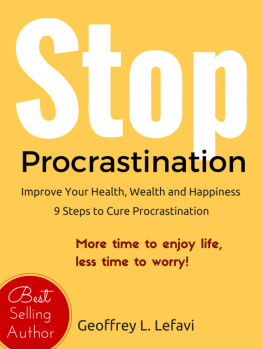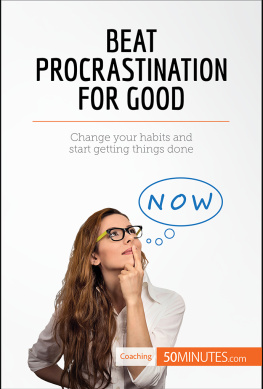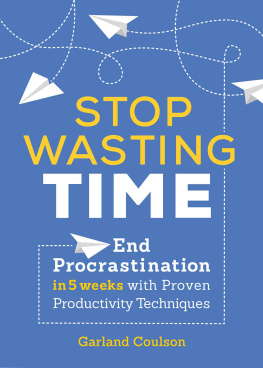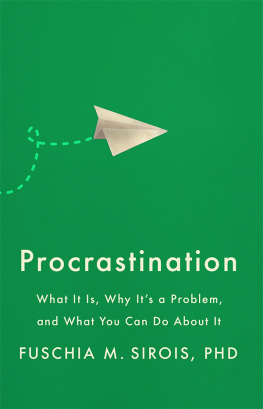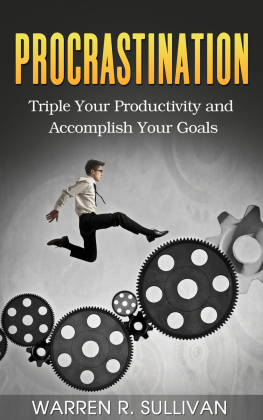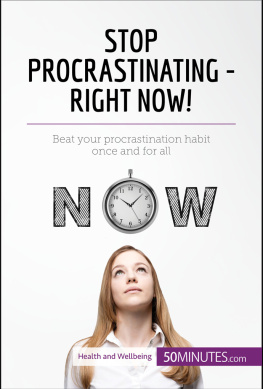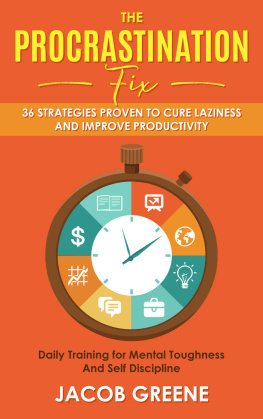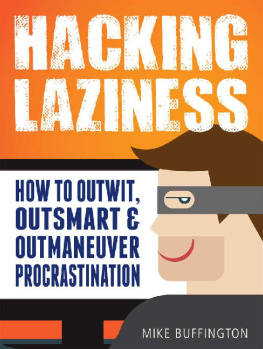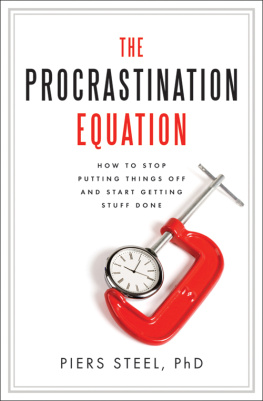StopProcrastination:
Improve Your Health,Wealth
andHappiness
9 Steps to CureProcrastination
By Geoffrey L. Lefavi
Copyright 2015, by Geoffrey L. Lefavi
Second Edition
More time to enjoy life and less time toworry.
Procrastination is a Learned Behavior. Youcan unlearn it.
Dedication
To: The nurses. They do the work.
About ThisBook
If you have ever struggled with procrastination whohasnt you must read this book. This book is a practical,no-nonsense book on helping you increase your health, wealth, andhappiness by stopping procrastination.
Procrastination is a bad habitlearned over time. It has become part of your automatic reactions,which are things you do not realize that you do every day. Withpractice, you can defeat your tendency to procrastinate. All youneed are the 9-Steps outlined in this book and a little bit ofpractice.
Twenty percent of people are chronic procrastinators.Others are occasional or infrequent procrastinators. Most employeeswaste twenty-five percent of their day by procrastinating. We willidentify the type of procrastination you have, why you do it, andhow to stop it.
By stopping procrastination, youcan increase your health, wealth, and happiness.
You can reach this goal if youstop doing something you already know you should not be doing. Islife that simple?
Yes, you can make it that simple. ~JeffLefavi
There are two quizzes in the Appendix. Thefirst physiological quiz will help you identify the degree of yourprocrastination. The second quiz will help you determine if you area morning person or an evening person. Knowing if you are a morningor evening person will help you to determine the best time to starta project.
Recommendation
Take the Procrastination Quiz beforereading this book (it just takes a few minutes). Then retake it acouple of weeks after you have been using the9-Steps; you will be amazed by your progress.
In this book we talk about projects or tasks.A project usually consists of several tasks (or steps). A taskmight be paint the kitchen in a project of get the house readyto be sold. The science behind procrastination is the same nomatter what the project, or how many tasks are in the project.
Follow the advice in thisbook and you will have more time to enjoy life and less time toworry .
This book is divided into three majorsections:
- The Introduction Section contains general information about procrastination.
- The 9 Steps to CureProcrastination Section which has the 9- Steps to CureProcrastination. This sections is a simple straight forwardprocess to your cure.
- The appendix has two quizzes andthe 9 Steps to Cure Procrastination Summary (one page summary ofthe 9 Steps) useful for a quick review of thesteps. The appendix also includes several other pieces of helpfulinformation.
Workaholic
I am not trying to turn you into aworkaholic. Workaholics are procrastinators. They work a lotbecause they believe they have to work a lot to do their jobcorrectly. Workaholics take on too many projects. Their desk andlife are in a state of disorganization. They accomplish less thanthe average person. They also feel guilty about leaving work, sincethey have not accomplished much due to procrastinating on theirwork.
Just because you work a lot does not mean youare a workaholic. People who work a lot because they enjoy theirwork are not workaholics , they are usuallywealthy and always happy people. They enjoy taking time off to livelife.
The old saying, Love what you do and do whatyou love, is the definition of a good life. If you enjoy your workand work a lot you are in the right place in your life good foryou. Many people do not love their work but work because they areresponsible adults. For responsible adults, this book will helpyou.
If you do not want to work a lot, but accomplish a lot, then great,this book is for you.
If you are a procrastinator, I know this bookwill help you. The 9-Steps to CureProcrastination has helped me.
IntroductionSection
What is Procrastination?
Why We Procrastinate
Where is Procrastination Located in theBrain?
What Procrastination Cost
Chronic Procrastinator
Being Rich
What isProcrastination?
procrastination2
to be slow or late about doing somethingthat should be done;
to delay doing something until a later timebecause you do not want to do it,
to put off intentionally the doing ofsomething that should be done.
In other words, procrastination is not doingsomething that you know you should be doing. You are doingsomething else to feel good now (known as immediategratification).
Immediategratification is the primarythreat to getting a task done.
Immediate gratification is settling for a smallimmediate reward (such as surfing the internet) instead of doing atask (painting the kitchen).
It can be perplexing why rational adults do not dowhat they should be doing. Procrastination is against logic. It isemotional and immediate satisfaction that run our actions, notlogic. We all do it: waste time, get bored, our mind wanders, wehave fun, or we do not know what to do next.
Procrastination can be damaging to your life it can damage your health, your wealth, and your happiness.
If you do not go to the doctor when you are supposed to or do asyour doctor says, you die. If you do not do your work, you loseyour job (loss of wealth). If you do not do your home duties, youlose your spouse (loss of happiness). These are all extremes ofwhat can happen and do happen every day.
A True Story about health:
A middle manager fromone of my first professional jobs was a chronic procrastinator. Agreat guy and a thoughtful guy, but a chronic procrastinator. Hisdesk was a mess, he was always late completing projects (if hecompleted them), he was obese, and his personal life was a mess.That said, he was a kind and caring person. I learned severalthings about business from him. He never followed through on hisdoctors required diets. A couple of years after I left thecompany, I heard he died of a heart attack. I was not surprised,but I was deeply saddened. He was not that old (in his 40s). All hehad to do was follow through with his doctors advice, and he wouldbe alive today.
Stopping procrastination means you will be able to increase your health, wealth, andhappiness . You can do this by stop doing something youalready know you should not be doing. Is life that simple? Yes, youcan make it simple.
A True Story about wealth:
As a profession, contractors arethe worlds worst procrastinators.Though,manygoodcontractors get thejob done, on time, the right way.
I was building a professionalbuilding. I had a building permit with a 30-day time limit onstarting the job. Construction must begin in 30 days, or thebuilding permit would be pulled. If the permit is pulled, I wouldhave to start the application process (including repaying fees)again.
I hired a contractor. He said noproblem; I will start tomorrow. He never showed up. I called himand emphasized that there was a time limit on the building permit.He said some lame excuse, and he would have some people working onmy sight tomorrow. The excuses continued for 28 days. The next daywas the last day to start construction. I made many threats, andconstruction contract reduction in pay was kickingin.
The contractor showed up andpush around some dirt to save our building permit. Here is aperson who depends on the goodwill of his customers for money. Hedoes not perform but spends more time making up excuses than doingthe job. He would be wealthier and happier if he just did hisjob.
Next page
